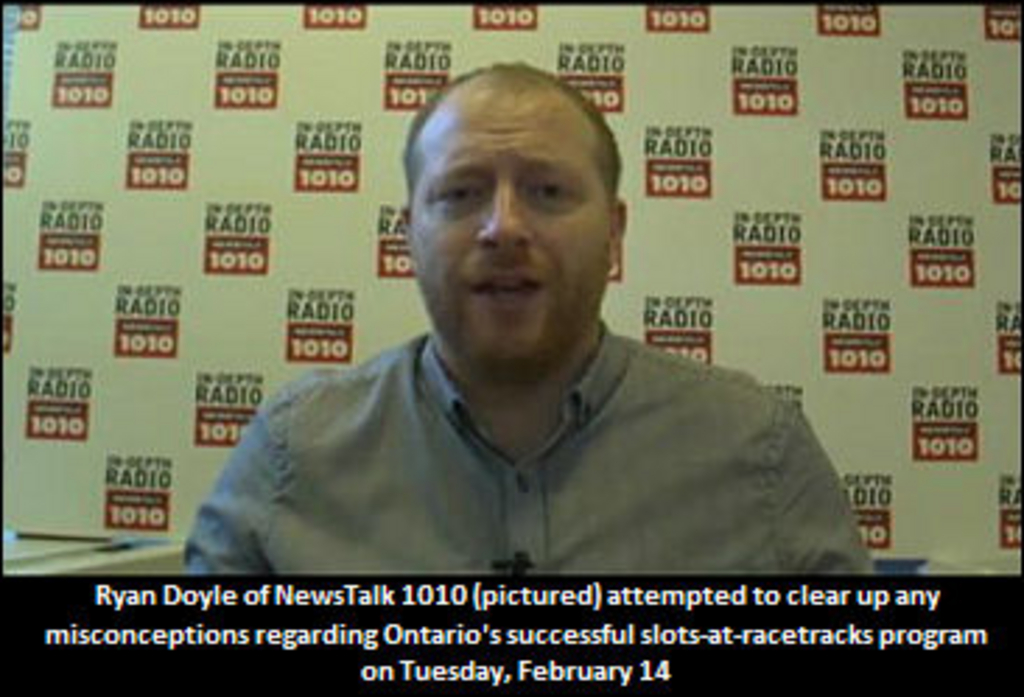Radio Host Addresses Slots-At-Racetracks Misconceptions

 It may not have come during his scheduled program, but Newstalk 1010 host Ryan Doyle stepped behind the microphone Tuesday morning (February 14) in an attempt to address some of the misinformation that has been thrown about since Ontario Finance Minister Dwight Duncan announced that cuts could be coming
It may not have come during his scheduled program, but Newstalk 1010 host Ryan Doyle stepped behind the microphone Tuesday morning (February 14) in an attempt to address some of the misinformation that has been thrown about since Ontario Finance Minister Dwight Duncan announced that cuts could be coming
to the province's slots-at-racetracks program.
In addressing the Economic Club of Canada ahead of Wednesday's release, Duncan stated that the cash-strapped government will review the $345 million allotted to quarter, thoroughbred and harness racing in Ontario each year through the Ontario Lottery & Gaming Commission's slots-at-racetracks partnership.
In reference to the slot-at-racetracks program, Doyle said that people should not accept the term 'subsidy,' which is currently being thrown around, as an accurate description for the multi-million-dollar pact.
"Dwight Duncan, came out and called it a 'subsidy' yesterday," said Doyle, who went on to explain the nature of the revenue sharing system which is the Ontario slots-at-racetracks program.
"They came up with a three-way revenue-sharing system where the OLG (Ontario Lottery and Gaming Corporation) gets their cut, the municipalities where these tracks are stationed get their cut, and the racetracks themselves and the racing industry itself --- and there are a lot of off-shoots to that; agriculture industry being one of the biggest --- gets 20 per cent … that, to me, is not a subsidy."
To listen to Doyle address the issue during the Tuesday, February 14 edition of Jerry Agar's Newstalk 1010 show, click here (note that the slots discussion starts at 39:45).
Related Stories


How did horse people get a
How did horse people get a share of revenue from the "Slots at Racetracks" program?
Minister Duncan has given no historical perspective on how this came about. He gives the impression that the government allocated money to horse racing for no particular reason.
Here is what happened:
From the 1950s, when betting on horses was the only legal form of gambling an industry was developed.
By 1990 there were about 20 racetracks of variable size operating throughout the province. An infrastructure had been created with tens of millions of dollars invested in farms, training centres, breeding stock, racetracks, etc. The industry was thriving by taking a small percentage from each dollar wagered.
During the 1990s the government decided to enter the casino business in a major way. Horse racing opposed this decision, fearing that this changing of the "rules" and encroachment into our traditional market would decimate the industry that had been created over a 40 year period.
After most municipalities rejected the idea of a casino, it was decided that slot machines would be placed at racetracks subject to revenue sharing with tracks and horse people.
The slots at racetracks are run by the Ontario Lottery Corporation. The tracks constructed the slot facilities and receive 10 percent of the win for basically being the landlord. The horsemen receive 10 percent of the win for compensation in lieu of reduced wagering on horse races. This maintains the industry.
It is well documented how the horse racing industry contributes significantly to the economy of Ontario.
The suggestion that this revenue sharing agreement is some kind of bizarre corporate welfare is offensive.
The entire issue is
The entire issue is presently being driven by the OLG (racings partner). The government is squeezing them to deliver more profit and racetracks are an easy target. Most are in rural markets and not Liberal supporters (constituents), we are a very diversified industry where most want someone else to fix their problems and watch from the sidelines. Soon we will see the government sell off their Casinos as they are all losing money. Having two Casinos in Niagara Falls ( one block apart) is a true money losing venture. Windsor Casino is a white elephant that is totally unprofitable and Rama is weak. Closing these money losing venues would clearly recoup the entire 350 million dollars the OLG is trying to save.
Slot parlors are very profitable and the government wants to close some (at racetracks) and relocate them closer to the slot players and racing is in the way. It is time for drivers, trainers, owners, grooms and race executives to speak out in the local markets and set the record straight or be assured the Honourable Dwight Duncan will finish you off in the media as demonstrated by Ryan Doyle. Don' t be fooled this is not an issue one group or individual can overcome and like me - get involved. The end may be closer than we realize and the trial balloons have been launched.
Let's fight back!